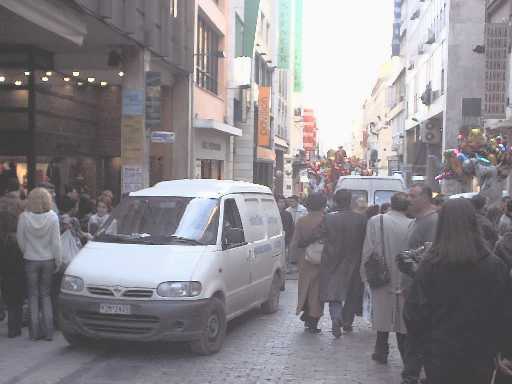
The pedestrian space, which is (mostly illegally) altered and compromised, makes more comfortable other activities, and produces (directly or indirectly) money and relevant interests.
Shop catering in the (pseudo)pedestrianised streets of Athens is done all day clock around, even during the peak shopping hours.
Many shops benefit from free (though illegal) parking space.
Also companies (e.g. dispatch companies) benefit from movement on "sidewalks" and (pseudo)pedestrianised streets
Objects from the nearby properties (like chairs and tables of cafes and restaurants) reduce significantly the width of sidewalks. Municipalities and enterprises share the extra incomings from the space deprived from the pedestrians.
For instance this is how a four metre wide sidewalk becomes less than one metre wide (Voulis street in the centre of Athens)
Super market and other shops clients are attracted from the free illegal parking.
Open private parking spaces take the opportunity ...
... to expand to the sidewalk and increase their profits.
This one is in Klafthmonos Square (the one with the underground garage, which is considered from the administration as beneficial for the pedestrians)
Of course shops selling cars take also part to the use of the pedestrian space for lucrative commercial purposes (photograph contributed by Alimos high school students - Alimos is an area in greater Athens agglomeration) .
These cars, illegally parked at night on the "sidewalk" of the most central avenue of Athens (Panepistimiou street) do pay. Of course those payments don't contribute to the public budget: in many cases gangs outside night clubs demand extortionately parking fees. Public attorneys have investigated such cases, but for unknown reasons no prosecutions neither any other conclusion has been publicly known. Greece tops on the corruption list among EU countries. (photo and story from the newspaper "To Vima")